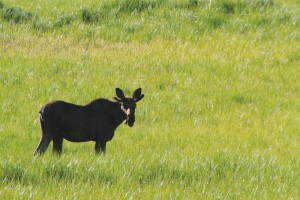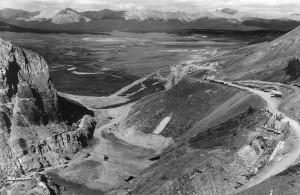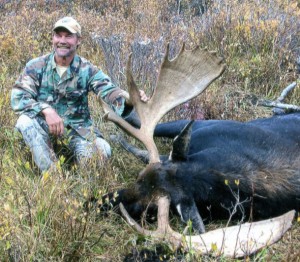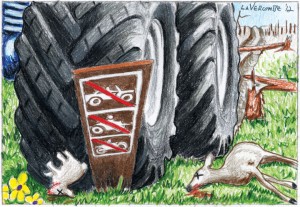by John Orr
The National Ski Areas Association Sues the Forest Service
Colorado Supreme Court Justice Greg Hobbs was speaking over in Breckenridge a couple of years back and told the group in attendance that “the water ditch is the basis of society.” Colorado law grew from those simple agricultural roots: put the water to beneficial use first and you get the right to divert the same amount in subsequent water years. Another early beneficial use developed around mining operations.
Water in Colorado is also a property right separate from the land.
Over time, Colorado has been witness to quite a body of interesting water case law and one judge execution by an irate diverter in the Arkansas Valley. New things keep coming up all the time, such as the current lawsuit between the National Ski Areas Association (NSAA) and the United States Forest Service (USFS).
The Forest Service issued a new clause for ski area permits in November that raised a firestorm of protest from the ski industry. The USFS updated the clause effective March 6, 2012. Then, around the Ides of March the NSAA filed an amended complaint directed at the new language. As we go to press the federal government has a week or so left to file their response.
It’ll be a while before we see a legal decision or settlement.
One of the attorneys working with the NSAA, Glenn Porzak, told Colorado Central that their complaint raises three primary issues:
First, he asks, “Can the Forest Service issue a directive without following the Administrative Procedures Act?”
From Wikipedia: “The Administrative Procedure Act … enacted June 11, 1946, is the United States federal law that governs the way in which administrative agencies of the federal government of the United States may propose and establish regulations.”
The Forest Service issued the March 6 clause with “no opportunity for public comment,” which amounts to, “a unilateral change in policy,” says Geraldine Link, the Director of Public Policy for the NSAA.
She maintains that the USFS would have heard an earful from grazers, ranchers, ski areas and the various state water administration agencies across the west – had they bothered to ask.
Second, Porzak wonders, “Do they have the authority to order conveyance (of a water right) as a permit condition?”
The new clause would replace language in the permit that resulted from a dispute over the 2004 White River National Forest proposed master plan. Porzak was part of the negotiating team back then and told Colorado Central that the resulting language was, “very much a cooperative effort,” that has “worked well for the last eight years.”
Among other things, the 2004 clause provides for joint ownership of water rights developed after June 21, 2004. According to Porzak, “The ownership of the pre-2004 water rights would remain exclusively with the ski areas if that was how they were acquired regardless of the language of the ski area permit that was in effect.”
Finally, the complaint raises the issue that the new clause amounts to a federal usurping of state water law. “It is such an affront to state law that it is not very popular” with Western congressional delegations, Porzak added.
The conveyance part of the equation is what bothered Colorado congressman Scott Tipton. He called for hearings and asked USFS to delay the rule. He told The Durango Herald that the clause amounted to a “taking” of private property.
Several U.S. senators sent a letter to the Forest Service asking for a moratorium on implementation. Senator Mark Udall, Senator Michael Bennet, Idaho Senator James Risch and Wyoming Senator John Barraso all chimed in.
The Forest Service responded last December by refusing to issue a moratorium.
The USFS “did not think this through,” says Link, adding ”one size fits all does not work with state water laws.”
For his part, Jim Pena. Assistant Deputy Chief United States Forest Service, told Colorado Central, that the NSAA and USFS had been discussing the language in the new clause for, “about one year.”
The new clause was an attempt “to clarify our mutual understanding of what was contained in the 2004 clause,” he says, adding, “On the National Forest any activity that requires development of water should be acquired in the name of the United States and remain available throughout the (term) of the permit.”
Pena cited the need for keeping ski areas in business for the length of their permit. Most ski areas in the West use a portion of their water rights for snowmaking. Snowmaking obviates some of the risk of low precipitation enabling an area to extend their season. Steve Segin, a public information officer for the Forest Service, told The Durango Herald, “It’s (the new clause) designed to protect the resource, not to take it away from anybody.”
Pena added that USFS permits have contained water rights clauses since the 1980s. The new clause is “predicated on the authority of individual states to issue water rights,” he said. The USFS “expects that they (permittees) put the water right in our (United States government’s) name” and the new clause, “does not affect existing permits,” nor does it affect water rights not developed on the national forest, according to Pena.
Pena told The Wall Street Journal that “his department plans to strengthen the language to make clear it doesn’t intend to sell the rights or repurpose them for any use but skiing.”
That’s a good idea, since Porzak maintains that the existing language would allow the USFS to use the rights for “a multitude of purposes,” such as “fish flows and other environmental purposes.”
Back in December Michael Berry, president of the NSAA, told ESPN “we believe they have crossed the Rubicon and this has the potential to be very, very impactful. We have no guarantee that they will continue to use the water for purposes of ski area business.”
Short takes
• Congratulations to Loren Otto, the Colorado BLM “2011 Volunteer of the Year.” Otto’s claim to fame is partly due to his work on the Kerber Creek Project a restoration effort in the San Luis Valley.
• The Federal Energy Regulatory Commission rejected the preliminary permit for the Flaming Gorge pipeline in February. Aaron Million vowed to try again for a FERC permit for the pipeline from the Green River and Flaming Gorge Reservoir to water the unbridled growth in eastern Colorado, including the lower Arkansas River Valley.
• After a dry and warm start to March snowpack is below average across the state. Here’s the lowdown for Central Colorado: Arkansas, 81% (best in the state); South Platte, 79%; Gunnison, 74%; Rio Grande, 81%. Storage is in good shape across the state thanks to the 2011 water year monster snowpack.
• The Colorado Department of Health and Environment published this year’s “Colorado’s Section 303(d) List of Impaired Waters and Monitoring and Evaluation List” in early March. Many streams and reservoirs in the area are on the list due to a long legacy of mining, transmountain diversions and agriculture in Central Colorado. You can download a copy from the CPDHE website: www.cdphe.state.co.us





